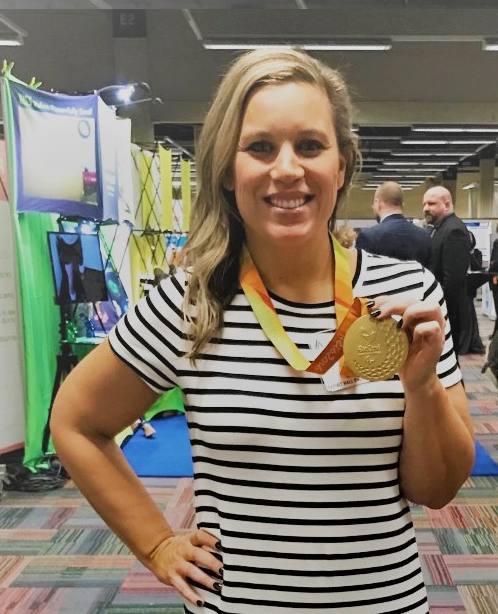Gold-medal volleyballer Nichole Millage looks back—and ahead—at her athletic career.
Before she lost her left leg below the knee in a 1998 boating accident, Nichole Millage was a high school volleyball star back home in Champaign, Illinois. It took nearly a decade before she got back to serving, setting, and spiking as a sitting volleyball player. Within a couple of years of learning the adaptive version of her sport, she’d earned a spot on Team USA and made her Paralympic debut in 2008 as a 31-year-old rookie. Two silver medals and a gold medal later, Millage is hoping to make one last run at the podium in 2021. Earlier this year she shared a few thoughts with Amplitude about her personal growth and the incredible progress adaptive sports have made during her decade-plus as a world-class competitor.
COVID-19 really threw a wrench into everyone’s plans. What has the adjustment been like?
For me personally, it’s been stressful in a lot of ways, because this is my last go-round. I’ve already made it known that I’m retiring after Tokyo. It’s not that I want to stop playing the sport, because I absolutely don’t. But I’m 43 years old. It’s getting harder to play, even though this year I [was] having a resurgence [before the shutdown]. I feel like I’ve had a very long, successful sports career. But there’s a lot more that comes with it than just the physical aspect and how hard it can be on your body. There’s also the mental toll that it takes, and all the behind-the-scenes stuff that people don’t see—a lot of hard times, a lot of tears, a lot of disappointment, a lot of frustration. When people ask, “Why would you retire? Why would you give this up?” I don’t see it as giving anything up. I just see it as moving on to the next phase.
Do you think you’ll remain connected to the Paralympic movement after Tokyo?
Absolutely. I will forever be talking about the Paralympics and sitting volleyball and disabled athletes. That is something I’ll do the rest of my life. I definitely see myself still being involved with my team in some ways. I’m not sure what that looks like yet. I find my role and responsibility on the team right now is to be an ear for the younger players who have dreams, who have questions, who might need encouragement. I really relish that role. So I can see myself doing that [after retirement]. The majority of our teammates that retire go on and we don’t really see them again, because they start families or move away. I think I’ll be unique in the fact that they’re not going to get rid of me quite that easily.
As you look back over your career—and don’t get me wrong, I know it isn’t over yet—but looking back to 2008, is there a single moment or achievement that you’re most proud of?
Sometimes people refer to me as an Olympian. I’m always very quick to correct them and say I’m a Paralympian. And the reason I do that is because I’m proud to be a Paralympian. That’s how I want to be known. We’re all under the same umbrella of Olympics, but at the same time all these different things that happened to me throughout my life are what got me to playing on this Paralympic team. I want you to refer to me as what I am and what I’m proud of being, which is a Paralympian.
Has that been an evolutionary process? When you think back to your first Paralympics in 2008, has that feeling of pride become more pronounced over time?
I would say for sure. It helps that more people are now familiar with the term Paralympian. I’ll still have occasional people get the Paralympics confused with the Special Olympics, so I’ll talk to them and explain the differences. It’s just a matter of people learning. It makes me very happy when I’m having a conversation with somebody and they’ve heard of the Paralympics. There’s still a lot of growth to be done, for sure. But I feel like more people than ever know what it means to be a Paralympian. I feel like it’s part of my job and responsibility to keep spreading the word.
Thinking beyond the Paralympics and beyond sports, is there a parallel awareness that’s occurring in society as more people are starting to understand disability in general?
Absolutely, I’m so glad you asked that. I’ve been seeing representations all over the place lately, and it makes me so happy when I see that. I have a couple examples of that. I shop at Target, so I look at the ads. And they have a model [Mama Cax], who sadly just passed away. But she had a prosthetic leg, and she was in ads for Target, and I loved seeing that.
Another great example is I’m a huge Project Runway fan. I’ve watched that show since the beginning. and they had a whole episode this year that featured Olympic and Paralympic athletes. I was watching that, and my heart was just so happy. It’s so awesome that they’re putting this into the mainstream. As much as I like watching the show because of the design aspect, I was almost in tears watching these different models with these different bodies. There was something about that that made me feel like we’re finally getting there.
